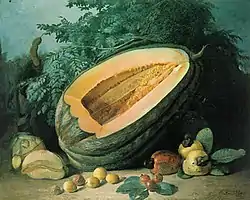
Museu Afro Brasil, São Paulo

Estêvão Roberto da Silva (1844? in Rio de Janeiro – 9 November 1891, in Rio de Janeiro) was an Afro-Brazilian painter and art teacher.
Life
His background is not known for certain, but his parents may have been slaves.[1] He enrolled at the Academia Imperial de Belas Artes in 1864, where he studied with Victor Meirelles and Agostinho José da Mota, who inspired him to specialize in still-lifes. In the 1880s, he became identified with the "Grupo Grimm", an association of disaffected artists that formed around the German-born painter Georg Grimm, although he never actually broke with the Academy's teaching methods.[2]
He was, however, involved in a protest concerning an award that he felt had been denied to him unjustly; a protest he made directly to Emperor Pedro II during the award ceremony. As a result, he came before a disciplinary committee that found him guilty of contempt for school discipline. Luckily, they also determined that he had no malicious intent, so he was suspended for one year rather than being expelled.[3] Despite this incident, he became the first Afro-Brazilian to graduate from the Academy and became a teacher at the "Liceu de Artes e Ofícios do Rio de Janeiro", where he remained until his death.[2]
In addition to his popular still lifes (mostly devoted to fruit), he painted some historical scenes and religious works.
References
- ↑ Biography: @ Catalogo das Artes.
- 1 2 Brief biography: @ the Enciclopédia Itaú Cultural.
- ↑ Pitoresco Archived 2005-02-22 at the Wayback Machine: excerpt from a book by Laudelino Freire that quotes the committee's decision.
Further reading
- Gonzaga Duque, A arte brasileira: pintura e esculptura, H. Lombaerts & co., 1888.
External links
- Cristina Pierre de França: "A pintura de Estevão Silva e sua relação com a brasilidade". In: III Encontro de História da Arte - Universidade Estadual de Campinas (2007)